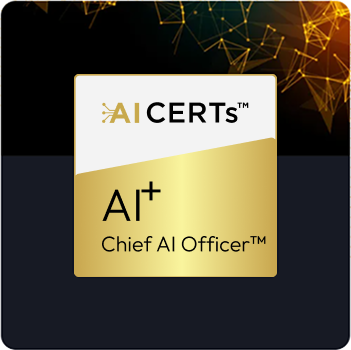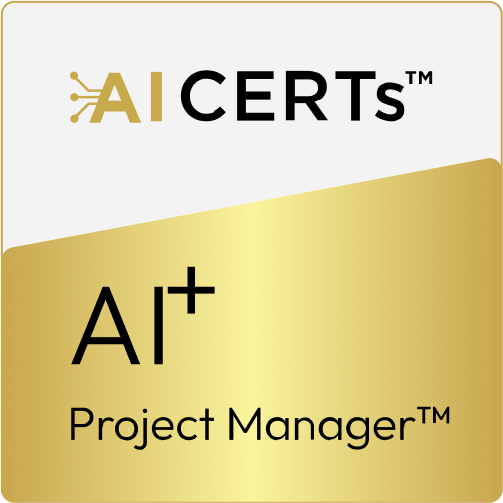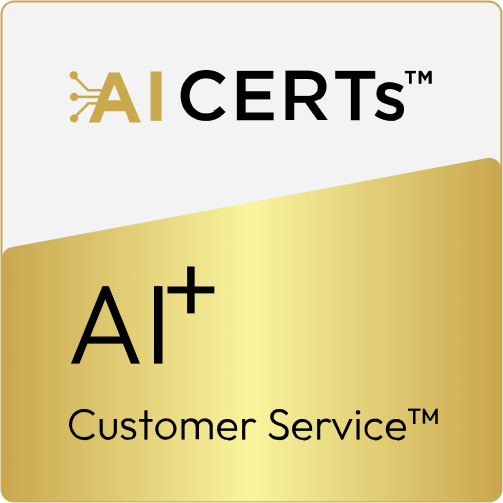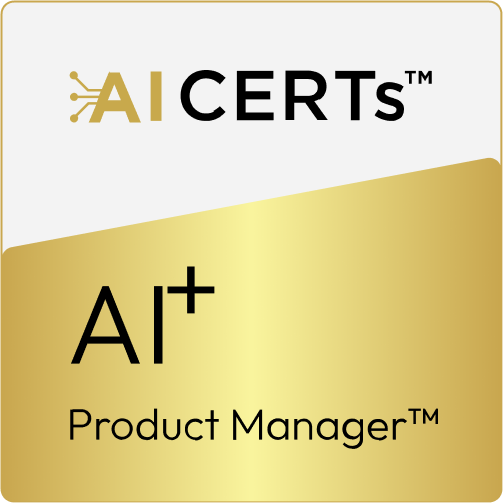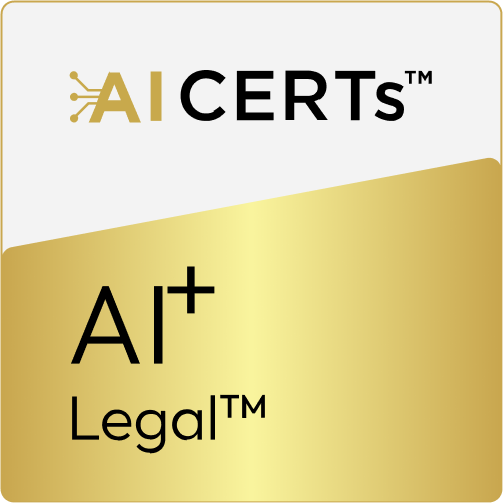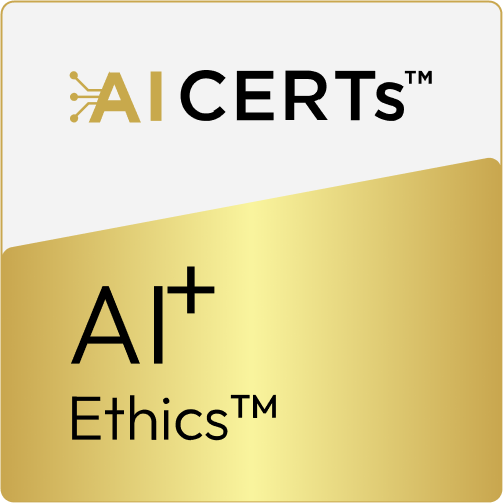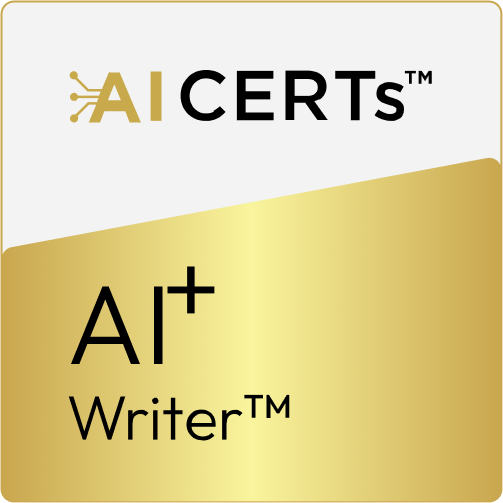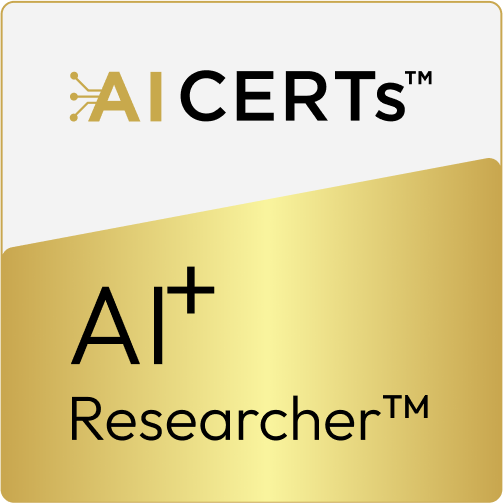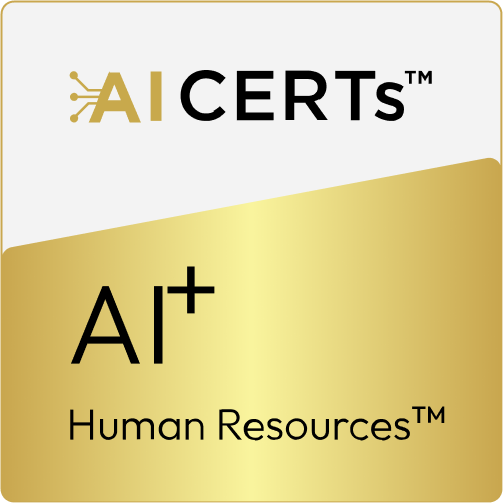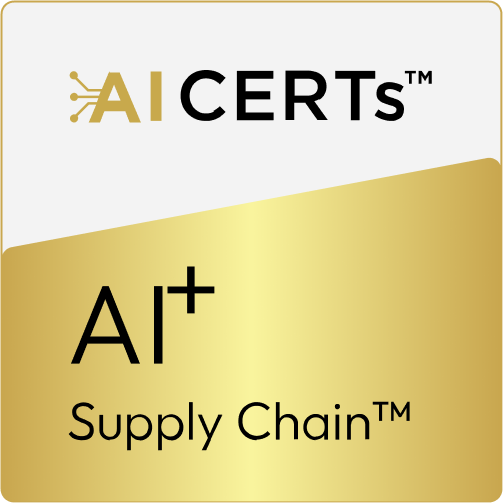AI+ Chief AI Officer™
# AP-910
AI Leadership for Chief Officers: Driving Innovation and Intelligence
- Leadership Upgrade: Equip C-suite executives to lead AI-driven innovation
- Efficiency Focus: Use AI tools to optimize operations, decision-making, and resources
- Strategic Role: Aligns AI implementation with business intelligence goals
- Course + Exam: Combines theory and practical insights in a compact format
AI+ Chief AI Officer™
0:00
Why This Certification Matters
- Drive AI Strategy:Learn to develop and execute a strategic AI roadmap to guide organizational growth and innovation.
- Manage Cybersecurity Risks: Gain insights into mitigating cybersecurity threats and ensuring AI systems' security and privacy.
- Foster Data-Driven Decisions: Master techniques to utilize data effectively for informed decision-making and business optimization.
- Build High-Performing Teams: Learn strategies to assemble and lead AI-focused teams that drive successful project execution.
- Navigate Regulatory Frameworks: Understand the regulatory environment around AI and ensure compliance while maximizing business impact.
At a Glance: Course + Exam Overview
Program Name
AI+ Chief AI Officer™
Included
Instructor-led OR Self-paced course + Official exam + Digital badge
Duration
Instructor-Led: 1 day (live or virtual) Self-Paced: 6 hours of content
Prerequisites
Basics of business management, Experience in a leadership or business admin role, Familiarity with fundamental AI concepts.
Exam Format
50 questions, 70% passing, 90 minutes, online proctored exam
Delivery
Projects & case studies
Outcome
Industry-recognized credential + hands-on experience

Who Should Enroll?
- Current CTOs, CIOs, or CDOs (Chief Digital Officers): Senior technology executives who are responsible for overseeing AI adoption.
- CEOs and Founders of Tech Companies: Entrepreneurs or CEOs of startups and tech companies who want to integrate AI technologies into their strategic vision.
- COOs and Operations Executives: Those responsible for the day-to-day operations of a business who seek to leverage AI to optimize operations.
- Students & New Graduates: Gain a competitive edge in the Chief AI Officer role by mastering AI tools and strategies that is driving leadership in AI innovation.
Available Dates
Job Roles & Industry Outlook
Chief AI Strategy Officer
Develops and executes AI-driven strategies that align with the organization's long-term goals, driving growth and competitive advantage.
Chief AI Ethics Officer
Ensures that AI applications and practices comply with ethical standards and regulations, promoting responsible AI usage.
Chief AI Integration Officer
Oversees the seamless integration of AI technologies into various departments and business functions to enhance efficiency and productivity.
Chief Data Science Officer
Oversees the data science department, ensuring the integration of AI and machine learning to optimize business decisions and processes.
Industry Growth: Empowering Sales Professionals with Data-Driven AI Insights
- According to McKinsey, 70% of executives report that AI is now a strategic priority for their organizations, underscoring the need for strong leadership to drive AI.
- The need for Chief AI Officers is increasing as companies adopt AI across business functions. CAIOs are vital for aligning AI strategies with organizational goals.
- Industries like healthcare, finance, and logistics are investing heavily in AI technologies. The CAIO role is crucial for managing and scaling these AI initiatives.
- AI is central to digital transformation, automating operations and enhancing decision-making. CAIOs lead the integration of AI to drive efficiency and innovation.
- AI technologies streamline business processes and improve productivity. The CAIO ensures that AI initiatives are strategically implemented to optimize operations.

Skills You’ll Gain
AI Strategy Development
Leadership and Team Management
AI Ethics and Governance
Data-Driven Decision-Making
What You'll Learn
Module 1: Foundations of AI and Leadership in the Digital Era
- 1.1 Defining Artificial Intelligence
- 1.2 Key AI Technologies
- 1.3 The CAIO’s Unique Role
- 1.4 Navigating Cybersecurity Challenges
- 1.5 Establishing Cross-Departmental Collaboration
- 1.6 Case Study
Module 2: Crafting a Strategic AI Roadmap
- 2.1 Aligning AI with Business Objectives
- 2.2 Setting Measurable Goals
- 2.3 Identifying Opportunities for Innovation
- 2.4 Engaging Stakeholders Across Departments
- 2.5 Monitoring Progress and Adjusting Plans
- 2.6 Case Study
Module 3: Building a High-Performance AI Team
- 3.1 Key Roles in an AI Team
- 3.2 Recruitment Strategies for Top Talent
- 3.3 Cultivating a Collaborative Culture
- 3.4 Continuous Learning Initiatives
- 3.5 Evaluating Team Performance
- 3.6 Case Study
Module 4: Ethics in AI Governance and Risk Management
- 4.1 Integrating Ethical Frameworks into AI Development
- 4.2 Conducting Ethical Impact Assessments
- 4.3 Developing Risk Mitigation Strategies
- 4.4 Establishing Transparency Protocols
- 4.5 AI Governance Models and Frameworks
- 4.6 Case Study
Module 5: Data-Driven Decision-Making and Business Impact Assessment
- 5.1 The Role of Data in AI Initiatives
- 5.2 Business Impact Assessment Frameworks
- 5.3 Measuring ROI from AI Investments
- 5.4 Hypothesis Testing in AI Projects
- 5.5 Resource Allocation Strategies
- 5.6 Case Study
Module 6: Driving Organization: Wide Adoption of AI
- 6.1 Creating Change Management Strategies
- 6.2 Communicating the Value of AI Initiatives
- 6.3 Addressing Resistance to Change
- 6.4 Metrics for Success Evaluation
- 6.5 Case Study
Module 7: Leveraging Generative AI for Business Innovation
- 7.1 Understanding Generative AI Capabilities
- 7.2 Identifying Areas for Innovation with Generative AI
- 7.3 Integrating Generative Solutions into Business Processes
- 7.4 Managing Risks Associated with Generative Applications
- 7.5 Creating Interdepartmental Synergies with Generative AI
- 7.6 Case Study
Module 8: Capstone Project
- 8.1 Project Overview and Objectives
- 8.2 Collaborative Work Sessions
- 8.3 Presentation Skills Workshop
- 8.4 Final Presentations and Constructive Feedback
- 8.5 Reflection on Key Takeaways from the Course Experience
Optional Module: AI Agents for Chief AI Officer
- 1. What Are AI Agents
- 2. Key Capabilities of AI Agents for the Chief AI Officer
- 3. Applications and Trends of AI Agents for the Chief AI Officer
- 4. How Does an AI Agent Work
- 5. Core Characteristics of AI Agents
- 6. Types of AI Agents
Tools You’ll Master

LeewayHertz (ZBrain)

C3.ai

Coupa (LLamasoft)

Zebra (Workcloud Demand Intelligence Suite)
Prerequisites
- Basic understanding of business management.
- Must have experience in a leadership or business admin role.
- Familiarity with fundamental AI concepts and technologies is recommended but not mandatory.
Exam Details
Duration
90 minutes
Passing Score
70% (35/50)
Format
50 multiple-choice/multiple- response questions
Delivery Method
Online via proctored exam platform (flexible scheduling)
Exam Blueprint:
- Foundations of AI and Leadership in the Digital Era - 11%
- Crafting a Strategic AI Roadmap - 11%
- Building a High-Performance AI Team - 13%
- Ethics in AI Governance and Risk Management - 13%
- Data-Driven Decision-Making and Business Impact Assessment - 13%
- Driving Organization-Wide Adoption of AI - 13%
- Leveraging Generative AI for Business Innovation - 13%
- Capstone Project - 13%
Choose the Format That Fits Your Schedule
What’s Included (One-Year Subscription + All Updates):
- High-Quality Videos, E-book (PDF & Audio), and Podcasts
- AI Mentor for Personalized Guidance
- Quizzes, Assessments, and Course Resources
- Online Proctored Exam with One Free Retake
- Comprehensive Exam Study Guide
Instructor-Led (Live Virtual/Classroom)
- 1 day of intensive training with live demos
- Real-time Q&A and peer collaboration
- Led by AI Certified Trainers and delivered through Authorized Training Partners
Self-Paced Online
- 6 hours of on-demand video lessons, e-book, and podcasts
- Learn anywhere, anytime, with modular quizzes to track progress
Discover Your Ideal Role-Based Certifications and Programs!
Not sure which certifications to go for? Take our quick assessment to discover the perfect role-based certifications and programs tailored just for you.
Frequently Asked Questions
What AI technologies will be covered in this course?
- The course includes an overview of key AI technologies such as machine learning, natural language processing, and neural networks, emphasizing their business applications.
What are the challenges faced by a Chief AI Officer?
- The challenges faced by a Chief AI Officer include ethical AI use, data privacy, aligning strategies with goals, overcoming resistance, and staying updated with evolving technologies.
Will I learn about developing an AI strategy for my organization?
- Yes, the course provides tools and insights for creating a comprehensive AI strategy that aligns with your organization's goals, including stakeholder analysis and technology alignment.
How applicable are the course teachings to non-tech industries?
- The principles and strategies discussed are designed to be applicable across various sectors, providing insights into how AI can be leveraged for strategic advantage in any industry.
How will the course help in building AI-focused teams?
- You will learn strategies for assembling and leading teams that are effective in AI project execution, including cross-functional collaboration and resource management.

